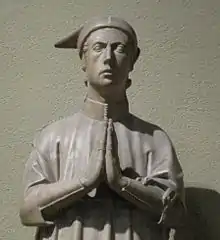Enrico degli Scrovegni
Enrico Scrovegni was a Paduan money-lender who lived around the time of Giotto and Dante. He was the son of Reginaldo degli Scrovegni and Capellina Malacapelli, and was married twice, first to a member of the Carrara family, then to Jacopina (Giacomina) d'Este, daughter of Francesco d'Este, Marquis of Ferrara. He may have been a member of the Cavalieri Gaudenti.

Enrico is most famous as the patron of Giotto, commissioning the great painter to paint the famous Scrovegni Chapel, c.1303-5, which he also commissioned. There is a tradition that he hired Giotto to atone for the sin of usury, although there is debate about whether this idea has any foundation. Dante placed his father in the Seventh Circle of Hell for his notoriously ill-gotten gains, and Enrico himself was a moneylender on a grand scale; it is these facts that have given rise to the tradition. Against the idea that he founded the chapel as an act of atonement may be cited the fact that it was a very sumptuous commission for his own personal use, attached to the grand palace that he built for himself. In 1320 Enrico Scrovegni fled the wars and civil strife that plagued Padua at the time, and settled in Venice. He was formally banished from Padua in 1328, and died in Venice in 1336.[1][2]
References
- Laura Jacobus 'Giotto and the Arena Chapel: Art, Architecture and Experience' (Turnhout and New York: Brepols/Harvey Miller, 2008); for the portrait statue: C. Di Fabio, "Memoria e modernità. Della propria figura di Enrico Scrovegni e di altre sculture nella cappella dell’Arena di Padova, con aggiunte al catalogo di Marco Romano", in Medioevo: immagine e memoria, I convegni di Parma, 11, atti (Parma, 23-26 sept. 2008) a cura di A.C. Quintavalle, Milan 2009, 532-546.
- Anne Derbes and Mark Sandona. The Usurer's Heart: Giotto, Enrico Scrovegni, and the Arena Chapel in Padua. Pennsylvania State University Press, 2008.
- Eimerl, Sarel (1967). The World of Giotto. Time-Life Books. New York: Time, Inc. pp. 109.